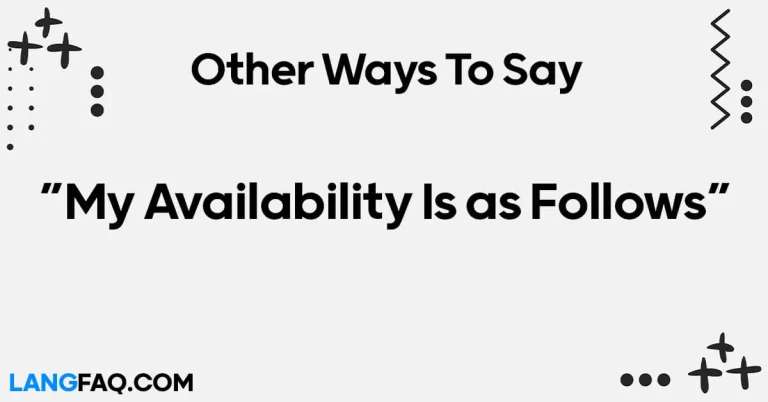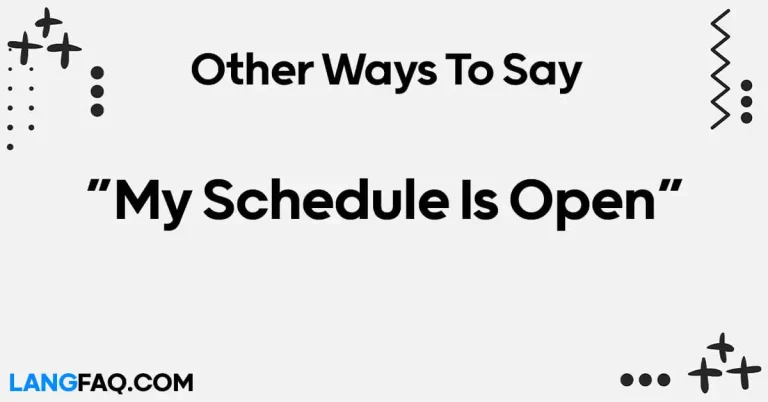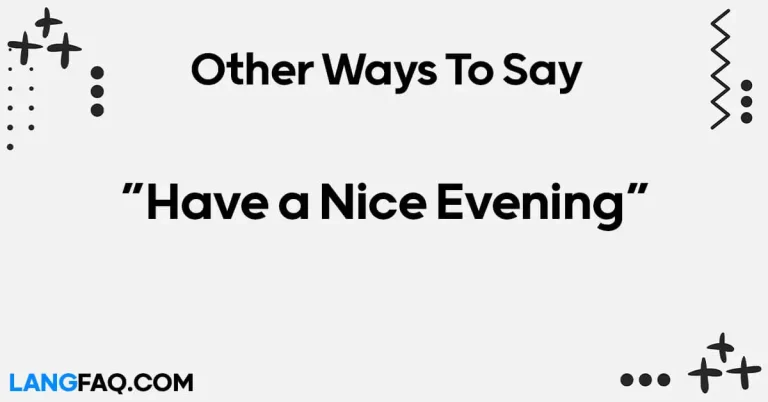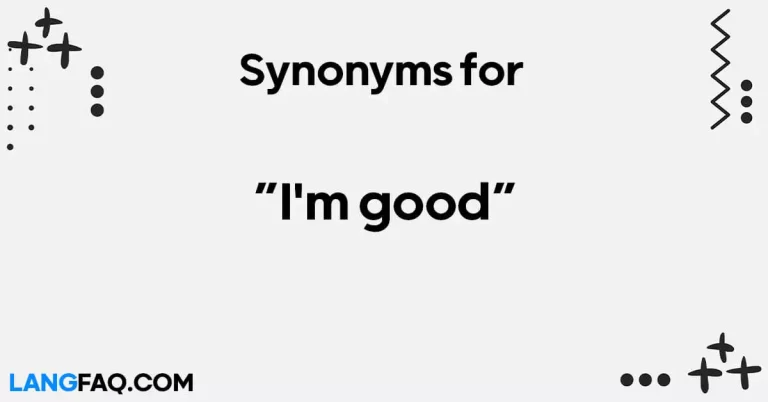Using polite language is crucial in any communication, whether in personal or professional settings. It shows respect and consideration for the other person while also maintaining a positive and polite tone.
When it comes to asking someone if they have completed a task or if they have had the chance to do so, it is important to use polite language to avoid coming across as demanding or rude.
The phrase “Did you get a chance” is often used to ask if someone has had the opportunity or time to do something. However, there are several polite alternatives to this phrase that can be used in different situations. Some examples include:
- “Have you had a chance to…”
- “Have you been able to…”
- “Have you managed to…”
- “Have you found time to…”
- “Have you had the opportunity to…”
- “Have you had a moment to…”
- “Have you had a break to…”
- “Have you had a minute to…”
- “Have you had a second to…”
- “Have you had a chance to take care of…”
- “Have you had a moment to attend to…”
- “Have you had time to handle…”
If someone has not completed a task, it is important to follow up in a polite and understanding manner. Some polite ways to do so include:
- “I understand you might be busy, but have you had a chance to…”
- “I know you have a lot on your plate, but have you had a chance to…”
- “I don’t want to interrupt your day, but have you had a chance to…”
- “I’m just checking in, have you had a chance to…”
- “I don’t mean to bother you, but have you had a chance to…”
By using polite language and alternatives to the phrase “Did you get a chance,” you can effectively communicate with others while maintaining a positive and respectful tone.
12 Polite Ways to Say “Did You Get a Chance”
- “Whenever you have a moment…”
When you want to give someone the freedom to choose when they can address a task or conversation, this phrase works wonders. It implies that there’s no rush. - “At your convenience…”
This expression conveys your willingness to adapt to the other person’s schedule, emphasizing their comfort. - “When it suits you…”
Use this phrase to signal your flexibility and respect for the other person’s timing. - “When you find the time…”
It suggests that you understand their busy schedule and are willing to wait for them. - “If it’s not too much trouble…”
Adding this phrase to your inquiry shows your consideration for their workload and availability. - “When you’re ready…”
Use this simple and open-ended phrase to let them decide when they can address the matter. - “Should you have a moment…”
This expression combines politeness with a gentle suggestion, allowing the other person to prioritize their tasks. - “When it’s convenient for you…”
It communicates your understanding of their priorities while awaiting their response. - “If and when you can…”
This phrase emphasizes flexibility and understanding without any pressure. - “When you get a chance, no rush…”
Reassure them that there’s no urgency or pressure to respond immediately. - “When you’re available…”
Use this phrase to acknowledge that their availability is essential. - “When you’re not too busy…”
It conveys your respect for their time and workload while leaving the decision to them.
Can You Say “Did You Get a Chance” in an Email?
Certainly! “Did you get a chance” is a common and polite phrase that you can use in an email when you want to inquire whether someone has had an opportunity to do something or if they’ve had the time to address a particular matter. It’s a courteous way to check in on their availability or progress. Here’s an example of how you can use it in an email:
Subject: Checking In on the Project Status
Dear [Recipient’s Name],
I hope this email finds you well. I wanted to touch base regarding the recent project we’ve been working on together. Did you get a chance to review the latest updates and provide any feedback?
Your input is essential to the project’s success, and we value your insights. Whenever you have a moment, please take a look and let us know your thoughts. If there are any scheduling constraints or if you need additional information, please don’t hesitate to share that with us.
We appreciate your dedication to this project, and we look forward to your response. Thank you for your time and effort.
Best regards, [Your Name]
In this email, the phrase “Did you get a chance” is used to inquire about the recipient’s availability to review the project updates. It maintains a polite and respectful tone while seeking their input.
Why Is It Important to Use Polite Language?
Using polite language is crucial because it fosters positive communication, shows respect, and helps build strong relationships. Politeness creates a harmonious environment where individuals feel valued and heard. It promotes empathy and understanding, preventing misunderstandings and conflicts.
Additionally, polite language reflects professionalism and can enhance one’s personal and professional reputation. It is essential in social interactions, customer service, and business settings.
By utilizing polite language, we demonstrate consideration for others, improve our communication skills, and contribute to a more polite and respectful society. Always remember to carefully choose your words, express gratitude, and use phrases such as “please” and “thank you” to maintain a courteous tone.
What Is the Meaning of “Did You Get a Chance”?
The phrase Did you get a chance?
is a polite way to inquire about whether someone had the opportunity to do something. It is commonly used to ask if someone had the time to complete a task or participate in a specific activity.
This question suggests that the person may have been busy or had other obligations. It is a thoughtful way to request an update or express interest without being demanding. By using this phrase, you demonstrate respect for the other person’s time and commitments.
How to Politely Ask Someone if They Have Completed a Task?
Asking someone if they have completed a task can be a delicate matter. You want to avoid coming across as pushy or demanding, while still conveying your need for an update. In this section, we will discuss 12 polite ways to ask someone if they have completed a task.
From using alternative phrases to acknowledging their busy schedule, these approaches will help you navigate this situation with grace and tact. So, let’s dive in and learn how to politely ask someone if they have completed a task.
1. “Have You Had a Chance to…”
To politely ask someone if they have completed a task, you can use the phrase “Have you had a chance to…”. Here are some steps to follow when using this polite inquiry:
- Start with a polite introduction or acknowledgment.
- Use the phrase “Have you had a chance to…” followed by the specific task or action you are referring to.
- End with a polite closing or offer assistance if needed.
For example, you could say, “Hi, I hope you’re doing well. Have you had a chance to review the report I sent you? Please let me know if you need any further information or assistance. Thank you!”
2. “Have You Been Able to…”
When politely asking someone if they have completed a task, consider using the phrase “Have you been able to…”
This phrase acknowledges the person’s ability and gives them the opportunity to provide an update on their progress. For example, you could say, “Have you been able to review the report?” or “Have you been able to schedule the meeting?”
This approach maintains a respectful tone and shows consideration for the person’s workload and availability. By using polite language, you can effectively communicate while maintaining a positive and professional relationship.
3. “Have You Managed to…”
To politely ask someone if they have completed a task, you can use the phrase “Have you managed to…” Here is a list of steps to follow:
- Start by expressing understanding: “I know you have been busy, but…”
- Use the phrase “Have you managed to…” to inquire about the task.
- Add specific details about the task to make your question more clear.
- Consider using alternative phrases like “Have you found time to…” or “Have you had the opportunity to…“
- End your question with a polite tone to show respect for the person’s time and workload.
4. “Have You Found Time to…”
To politely ask someone if they have found time to complete a task, you can use phrases such as:
- “Have you found time to…”
- “Have you had a chance to…”
- “Have you been able to…”
- “Have you managed to…”
- “Have you had the opportunity to…”
- “Have you had a moment to…”
- “Have you had a break to…”
- “Have you had a minute to…”
- “Have you had a second to…”
- “Have you had a chance to take care of…”
- “Have you had a moment to attend to…”
- “Have you had time to handle…”
Using these phrases demonstrates politeness while inquiring about task completion.
5. “Have You Had the Opportunity to…”
When politely asking someone if they have completed a task, one can use the phrase “Have you had the opportunity to…” in a respectful manner. Here are some steps to follow:
- Begin by acknowledging their busy schedule.
- Express your understanding and respect for their time.
- Use the phrase “Have you had the opportunity to…” followed by the task.
- End with a polite tone, expressing gratitude for their attention.
Remember, using polite language is important in maintaining positive relationships and effective communication.
6. “Have You Had a Moment to…”
When politely asking someone if they have completed a task, you can use the phrase “Have you had a moment to…” to inquire about their progress politely.
- Begin by expressing understanding and empathy for their busy schedule.
- Use the phrase “Have you had a moment to…” to ask if they have had time for the specific task.
- End the sentence with the task or action you are inquiring about.
For example, you could say, “I understand you’re busy, but have you had a moment to review the project proposal?” This approach acknowledges their workload while politely seeking an update.
True story: While working on a team project, I needed to follow up with a colleague who was responsible for gathering data. I approached them by saying, “I know you have a lot on your plate, but have you had a moment to collect the data we need?” This polite inquiry helped maintain a positive and respectful working relationship.
7. “Have You Had a Break to…”
Taking breaks is crucial for maintaining both productivity and well-being. Here’s how to politely inquire if someone has taken a break:
- Choose an appropriate time to ask, ensuring you’re not interrupting important tasks.
- Begin the conversation by acknowledging their workload and expressing understanding of their busy schedule.
- Use the phrase “Have you had a break to…” to inquire if they have taken a moment to rest.
- Show genuine concern for their well-being and emphasize the importance of taking breaks for rejuvenation.
- Offer assistance or suggest ways to help them find time for a break if necessary.
- Thank them for their efforts and assure them that you respect their priorities.
8. “Have You Had a Minute to…”
When you need to politely ask someone if they have had a chance to complete a task, you can use the phrase “Have you had a minute to…” Here are some steps to follow:
- Choose the appropriate time to ask.
- Approach the person respectfully.
- Use a pleasant tone of voice.
- Begin your sentence with “Have you had a minute to…”
- State the task or request politely.
- Give the person time to respond.
- Thank them for their attention.
9. “Have You Had a Second to…”
If you need to politely ask someone if they have had a moment to complete a task, you can use the phrase “Have you had a second to…” in a respectful and considerate tone. Here are a few steps to follow:
- Approach the person politely and respectfully.
- Acknowledge their busy schedule or workload.
- Use the phrase “Have you had a second to…” to inquire about the task.
- Be patient and understanding.
- Appreciate their time and effort, regardless of the answer.
Remember, using polite language is crucial in maintaining positive and respectful relationships.
In the eighteenth century, European royalty often utilized polite language to uphold decorum and show respect to their peers, setting the standard for courteous communication in modern society.
10. “Have You Had a Chance to Take Care of…”
To politely ask someone if they have completed a task, consider using the phrase “Have you had a chance to take care of…” followed by the task at hand. Here are some steps to follow when using this polite request:
- Begin by expressing understanding for their busy schedule.
- Use a soft tone and avoid sounding demanding.
- Clearly state the specific task you are referring to.
- Provide any necessary context or deadline for the task.
- End with a polite expression of gratitude for their attention to the matter.
Remember, using polite language helps maintain positive relationships and fosters effective communication. It shows respect for the other person’s time and responsibilities.
11. “Have You Had a Moment to Attend to…”
When politely asking someone if they have completed a task, you can use the phrase “Have you had a moment to attend to…” This phrase conveys respect and acknowledges that the person may be busy.
Here are some steps to follow:
- Start the conversation with a polite greeting.
- Express your understanding of their workload or schedule.
- Ask if they have had a moment to attend to the task.
- Thank them for their time and consideration.
Using polite language shows respect and helps maintain positive relationships in both personal and professional settings.
In ancient Japan, it was customary for individuals to use polite language, known as keigo, to show respect to those of higher social status or authority. This tradition has continued to influence modern Japanese language and culture.
12. “Have You Had Time to Handle…”
To politely ask someone if they have completed a task, you can use various phrases to inquire about their availability. Here are 12 examples:
- “Have you had time to handle [task]?”
- “Have you had a chance to [task]?”
- “Have you been able to [task]?”
- “Have you managed to [task]?”
- “Have you found time to [task]?”
- “Have you had the opportunity to [task]?”
- “Have you had a moment to [task]?”
- “Have you had a break to [task]?”
- “Have you had a minute to [task]?”
- “Have you had a second to [task]?”
- “Have you had a chance to take care of [task]?”
- “Have you had a moment to attend to [task]?”
Using these phrases demonstrates your politeness and respect for the other person’s time and availability.
How to Politely Follow Up if Someone Has Not Completed a Task?
Have you ever needed to follow up with someone about a task or request, but didn’t want to come across as pushy? It can be challenging to find the right words to politely ask if something has been completed. In this section, we’ll explore five different ways to follow up without being too forceful. These phrases will help you maintain a respectful tone while still getting the information you need.
1. “I Understand You Might Be Busy, But Have You Had a Chance to…”
When checking on the completion of a task, it is important to use polite language to maintain a respectful tone. A good example of this is to ask, “I understand you may have a lot going on, but have you had a chance to…” This statement acknowledges the person’s potential busyness while also inquiring about the task. By using polite language, you demonstrate consideration for the person’s time and workload, promoting positive communication and preserving good relationships.
2. “I Know You Have a Lot on Your Plate, But Have You Had a Chance to…”
Using polite language is crucial as it demonstrates respect and consideration for others. One courteous way to inquire about the completion of a task is by saying, “I know you have a lot on your plate, but have you had a chance to…” This acknowledges their busy schedule while still showing interest in the task. Other polite alternatives include phrases like, “I understand you might be busy, but…” or “I don’t want to interrupt your day, but…” Remember, utilizing polite language promotes positive communication and helps maintain good relationships.
3. “I Don’t Want to Interrupt Your Day, But Have You Had a Chance to…”
When politely asking someone if they have completed a task, it’s important to be respectful and considerate of their time. Here are some steps to follow:
- Begin by acknowledging their busy schedule: “I don’t want to interrupt your day.”
- Phrase the question politely: “Have you had a chance to…”
- Specify the task or action you are referring to.
- End with a polite tone: “But have you had a chance to attend to it?”
Remember, using polite language shows respect and helps maintain positive relationships. Consider the other person’s workload and offer assistance if needed.
4. “I’m Just Checking In, Have You Had a Chance to…”
When following up on a task, it is important to use polite language. One way to do this is by saying, “I’m just checking in, have you had a chance to…?” This phrase acknowledges the person’s potential busyness and shows consideration for their time. It also demonstrates a respectful tone and avoids sounding demanding or impatient. Using this polite approach helps maintain positive relationships and encourages open communication. Remember to always use polite language when interacting with others, as it fosters a respectful and professional environment.
5. “I Don’t Mean to Bother You, But Have You Had a Chance to…”
Using a polite and respectful tone is important when asking someone if they have completed a task. Here are the steps to politely ask if someone has had a chance to do something:
- Begin with acknowledging their busy schedule: “I don’t mean to bother you”
- Phrase the question politely: “But have you had a chance to…”
- State the specific task: “complete the report we discussed?”
I once needed an urgent favor from a colleague who was always busy. I approached them with a polite tone, saying, “I don’t mean to bother you, but have you had a chance to review the document I sent? It’s quite important.” They appreciated my respectful approach and promptly completed the task.
What to Say Instead of “Did You Get a Chance”
1. “Whenever You Have a Moment…”
Scenario: Formal and Professional
Explanation: This phrase indicates a high level of flexibility, allowing the other person to choose when to address the matter. It’s perfect for professional settings where you want to respect someone’s busy schedule.
Example: In a work email to a colleague: “Whenever you have a moment, could you please review the project proposal?”
2. “At Your Convenience…”
Scenario: Formal and Polite
Explanation: This expression emphasizes the recipient’s comfort and timing. It’s suitable for both professional and personal contexts.
Example: In an email to a client: “Please let us know when it’s at your convenience to schedule a meeting.”
3. “When It Suits You…”
Scenario: Casual and Polite
Explanation: This phrase conveys flexibility and courtesy in a more relaxed manner, making it suitable for both formal and informal conversations.
Example: When texting a friend: “Hey, I’d love to catch up over coffee whenever it suits you.”
4. “When You Find the Time…”
Scenario: Casual and Considerate
Explanation: It suggests that you understand the other person’s busy schedule and are willing to wait for them, making it ideal for casual conversations.
Example: Talking to a family member: “Let’s plan that movie night when you find the time.”
5. “If It’s Not Too Much Trouble…”
Scenario: Polite and Considerate
Explanation: Adding this phrase shows your consideration for their workload and availability while maintaining a polite tone.
Example: In an email to your supervisor: “If it’s not too much trouble, could you please provide feedback on the report?”
6. “When You’re Ready…”
Scenario: Casual and Patient
Explanation: This simple and open-ended phrase leaves the decision to the other person, making it suitable for informal conversations.
Example: Texting a friend: “Let’s discuss the travel plans when you’re ready.”
7. “Should You Have a Moment…”
Scenario: Formal with a Gentle Suggestion
Explanation: This expression combines politeness with a gentle suggestion, allowing the other person to prioritize their tasks.
Example: In a work context, discussing a meeting: “Should you have a moment, we’d like to schedule a brief discussion.”
8. “When It’s Convenient for You…”
Scenario: Formal and Respectful
Explanation: It communicates your understanding of their priorities while awaiting their response, suitable for professional settings.
Example: In an email to a business partner: “We can finalize the contract when it’s convenient for you.”
9. “If and When You Can…”
Scenario: Polite and Flexible
Explanation: This phrase emphasizes flexibility and understanding without imposing a strict timeline.
Example: Chatting with a mentor: “I’d appreciate your guidance if and when you can spare some time.”
10. “When You Get a Chance, No Rush…”
Scenario: Casual and Relaxed
Explanation: Reassure them that there’s no urgency or pressure to respond immediately, making it suitable for friendly conversations.
Example: Discussing weekend plans with a friend: “Let’s catch up for brunch when you get a chance, no rush.”
11. “When You’re Available…”
Scenario: Polite and Respectful
Explanation: Use this phrase to acknowledge that their availability is essential, especially in professional contexts.
Example: In an email to a colleague: “We’d like to schedule a team meeting when you’re available.”
12. “When You’re Not Too Busy…”
Scenario: Considerate and Relaxed
Explanation: It conveys your respect for their time and workload while leaving the decision to them, perfect for casual conversations.
Example: Planning a gaming night with friends: “Let’s play when you’re not too busy.”
These alternative phrases offer you a diverse set of options to convey your message politely, whether you’re in a formal or informal setting. Now, let’s explore some variations for different situations and relationships.
Variations for Different Situations and Relationships
Colleagues:
- Formal: “Whenever it’s suitable for your schedule, could you kindly review the report?”
- Casual: “Let’s discuss this project when you have a moment.”
Friends:
- Polite: “Whenever you’re free, we can catch up over lunch.”
- Relaxed: “Let’s hang out when you’re not too busy.”
Mentor-Mentee:
- Respectful: “I’d appreciate your insights when you find the time.”
- Considerate: “Whenever it’s convenient for you, I’d like to discuss my progress.”
Remember, the key to effective communication is not just what you say but how you say it. These alternative phrases will help you maintain courtesy and respect while ensuring your message is well-received in various contexts.
Frequently Asked Questions
What are some alternative ways to ask if someone has had a chance to read your email?
One option is to use the present perfect tense and say “Have you had a chance to read my email?” Another option is to use a more direct question, such as “Did you get the chance to read my email?
How can I make sure my email catches the recipient’s attention?
Using fun elements like emojis or bullet points can help make your email stand out. You can also use the recipient’s name or add a catchy subject line to make it more eye-catching.
Is it important to use the recipient’s name in the email salutation?
Yes, using the recipient’s name can personalize the email and make it more engaging. However, if you do not know the recipient’s name, a generic salutation like “Dear Sir/Madam” can still be used.
How can I end my email in a polite yet effective manner?
Using phrases like “Kind regards” or “All ears” can show your willingness to listen and respect the recipient’s opinion. You can also include a call to action, such as asking for their feedback or response, to end your email on a strong note.
What are some best practices for writing the body of a business email?
Some essential ways to craft a strong email body include using the active voice, being to the point, and using a clear and concise message. You can also use a table of contents or bullet points to make it easier for the recipient to follow along.
How can I make sure my email stands out in a busy business period?
Consider adding some personal touches, such as using the recipient’s preferred phrase or mentioning something you know about them. You can also try incorporating non-verbal cues, like using emojis, or sending a physical reminder to catch their attention.







